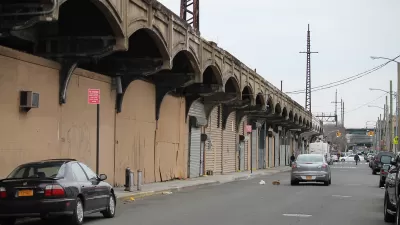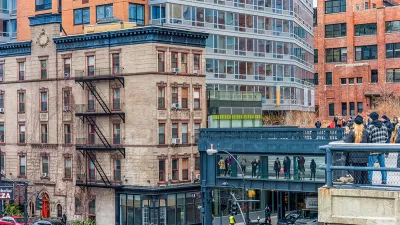Queen's version of Manhattan's High Line is known as the QueensWay, an abandoned LIRR branch that went from Rego Park to Rockaway. Two congressmen have now endorsed a plan to bring the train back - though planning for the new park has already begun.

It could be viewed as a case of "rails to trails", or rails to rails. It's also a competition between 'active transportation', i.e. walking and biking (and do note that the 'original' High Line prohibits biking) and commuter rail. Each side has their advocates.
With the support of two area congressmen, the rail advocates now have some political clout.
Domenick Rafter writes that "(a) source familiar with the plan to bring transit back to the line, which runs from Rego Park to the Rockaways and has been abandoned since 1962, said it will get the backing of the two Congressmen representing southern Queens."
The source says Reps. Hakeem Jeffries (D-Brooklyn) and Greg Meeks (D-Jamaica), whose districts meet at the Ozone Park section of the line, will endorse the proposal and push to allocate federal transportation subsidies to study a plan for bringing rail service back.
The rail idea has been championed by officials in the Rockaways, especially Assemblyman Phil Goldfeder (D-Rockaway Park). Supporters of reactivating the line, which connects to the Long Island Rail Road's (LIRR)) main route into Penn Station at Rego Park, say it would drastically cut commute times for Rockaway residents, which are among the highest in the city. When the LIRR went to Rockaway Park in the 1950s, it took only about 40 minutes to get from the peninsula to Penn Station. Today, a ride on the A train could take more than twice that.
In January, the Queensway plan was reported here, and is championed by the Friends of The QueensWay. (For images past and present, click on 'gallery').
The last train ran down the line in June 1962 and the route south of Rockaway Boulevard is now occupied by the A train.
The news (of the expected endorsement of the congressmen) comes after New York Times opinion writer Eleanor Randolph penned a column last weekend about the other proposed plan for the line — the Queensway.
Randolph wrote that the project was awarded a "$467,000 environmental protection grant through the state’s Office of Parks, Recreation and Historic Preservation. The grant will help pay for a community planning survey and a feasibility study..."
Both alternatives share at least one all too familiar aspect of much local planning - local opposition. Rafter writes of a new "movement, 'No Way Queensway,' aimed at killing both the rail and park plans."
Correspondent's note: Both congressmen endorsed the 'rails to rails' alternative plan. It will be referenced as a comment below after the article is published in the Queens Chronicle.
FULL STORY: Rockaway Beach rail plan to be backed by Reps. Jeffries, Meeks

Maui's Vacation Rental Debate Turns Ugly
Verbal attacks, misinformation campaigns and fistfights plague a high-stakes debate to convert thousands of vacation rentals into long-term housing.

Planetizen Federal Action Tracker
A weekly monitor of how Trump’s orders and actions are impacting planners and planning in America.

In Urban Planning, AI Prompting Could be the New Design Thinking
Creativity has long been key to great urban design. What if we see AI as our new creative partner?

King County Supportive Housing Program Offers Hope for Unhoused Residents
The county is taking a ‘Housing First’ approach that prioritizes getting people into housing, then offering wraparound supportive services.

Researchers Use AI to Get Clearer Picture of US Housing
Analysts are using artificial intelligence to supercharge their research by allowing them to comb through data faster. Though these AI tools can be error prone, they save time and housing researchers are optimistic about the future.

Making Shared Micromobility More Inclusive
Cities and shared mobility system operators can do more to include people with disabilities in planning and operations, per a new report.
Urban Design for Planners 1: Software Tools
This six-course series explores essential urban design concepts using open source software and equips planners with the tools they need to participate fully in the urban design process.
Planning for Universal Design
Learn the tools for implementing Universal Design in planning regulations.
planning NEXT
Appalachian Highlands Housing Partners
Mpact (founded as Rail~Volution)
City of Camden Redevelopment Agency
City of Astoria
City of Portland
City of Laramie




























